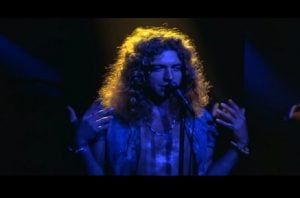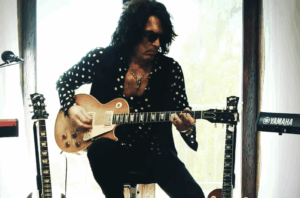The 5 Johnny Cash Songs That Are Socially Relevant Til This Day

via @JohnnyCashVEVO / YouTube
Johnny Cash had a way of putting his finger on the pulse of American society. With his deep baritone and no-nonsense delivery, he wasn’t just telling stories—he was calling things out. His music didn’t always shout to be heard, but the messages rang loud and clear.
Even outside of the mainstream hits, Cash used his platform to shine a light on the forgotten, the mistreated, and the misunderstood. His lyrics often addressed issues that others in the industry avoided: prison reform, poverty, war, and social inequality. And he didn’t just sing about them—he lived those values on and off the stage.
What’s striking is how relevant many of these songs still feel today. Decades after they were first recorded, their messages haven’t lost their bite. Whether it’s a warning, a plea, or a pointed critique, these tracks still echo through modern headlines—and they’re well worth another listen.
View this post on Instagram
“Don’t Take Your Guns To Town”, The Fabulous Johnny Cash (1958)
Johnny Cash put this sad little ballad together back in 1958. “Don’t Take Your Guns To Town” tells the story of a cowboy, still wet behind the ears, who opts not to listen to the advice of his mother. That advice is the title of the song, and, as one might expect, the cowboy meets his end in an avoidable gunfight in town.
While the song might read like a simple Western tragedy, it carries a deeper message about impulsive masculinity and gun culture. It serves as a subtle but powerful warning about the glorification of violence and the dangers of ignoring wisdom passed down through generations. Cash doesn’t preach here—he just tells the story and lets the consequences speak for themselves.
Decades later, the song feels hauntingly relevant. In a world where gun violence and youthful recklessness still make headlines, this tale hits close to home. It’s a reminder that the cost of pride can be irreversible, and that some lessons are best learned before it’s too late.
“Apache Tears”, Bitter Tears: Ballads of the American Indian (1964)
“Apache Tears” is one of the more emotional cuts from Cash’s 1964 concept album Bitter Tears, which focused entirely on Native American struggles. The song paints a grim and poetic picture of the loss and displacement Native communities endured during America’s westward expansion. The lyrics are rooted in real historical trauma, told with restraint and sorrow.
Cash doesn’t sensationalize the suffering—he mourns it. His voice, steady but thick with emotion, carries the weight of generations lost and cultures broken. The song doesn’t just honor the past; it forces listeners to acknowledge it, even if it’s uncomfortable. At a time when indigenous voices were mostly absent from mainstream narratives, this song was a rare act of advocacy.
“Apache Tears” still matters today because it speaks to a legacy that hasn’t gone away. The injustices it references remain unresolved in many parts of the world, and the struggle for Native rights and recognition continues. Cash gave voice to a history too often erased, and that courage remains significant.
“White Girl”, Bitter Tears: Ballads of the American Indian (1964)
Another bold track from Bitter Tears, “White Girl” tackles the subject of interracial relationships in a time when that topic was still taboo. Originally written by Peter La Farge, the song tells the story of a Native man and his love for a white woman, highlighting the social and cultural rejection they face. It’s a tender track, but one that doesn’t shy away from the bitter reality.
The song pushed boundaries not only with its subject matter but also with the reaction it provoked. Radio stations refused to play it, and Cash’s label was hesitant to promote it. But true to form, Cash didn’t back down. He believed in the message, and he made sure the song was heard—distributing copies to DJs himself when needed.
In today’s world, where conversations about race and relationships are still evolving, “White Girl” stands out as a pioneering voice. It’s a song about love, yes—but also about systemic bias and the walls people are forced to climb just to be with who they love. Cash didn’t just talk about unity—he sang it, lived it, and defended it.
“San Quentin”, At San Quentin (1969)
“San Quentin” is arguably the most explosive song on this list. Released as part of Cash’s At San Quentin live album in 1969, the track is a direct confrontation of the American prison system. Cash didn’t sugarcoat his stance—he sang it right in front of the inmates of San Quentin prison, who roared with applause and appreciation.
The song takes the perspective of a prisoner who’s angry, mistreated, and stripped of humanity. It’s raw and honest, with lines that seethe with frustration at the institution itself. Cash’s delivery is intentionally blunt, echoing the real pain and resentment of those locked away, many of whom were victims of an unforgiving system.
Half a century later, the issues Cash highlighted haven’t gone away. Prison reform is still a pressing topic, and “San Quentin” continues to resonate with those advocating for justice and dignity behind bars. It’s a fearless piece of music, not just for its message but for the way Cash used his voice when so few others dared to.
“Singing In Vietnam Talking Blues”, Man In Black (1971)
Released in 1971 during the height of anti-war sentiment in America, “Singing In Vietnam Talking Blues” tells the story of Johnny Cash and June Carter’s trip to perform for troops overseas. But this isn’t a flag-waving anthem—it’s a reflective, sometimes weary meditation on the cost of war. Cash’s tone here is one of concern, not condemnation.
The song walks a fine line between supporting the soldiers and questioning the war they’re in. He doesn’t point fingers at the individuals, but he does challenge the purpose behind their suffering. In a few short verses, Cash manages to humanize those in uniform while still lamenting the conflict that brought them there in the first place.
This song remains important not only because of its historical context, but because of its compassionate stance. Wars may change, but the trauma and confusion felt by those caught in them stays the same. Cash’s message—that the soldiers deserve more than just songs, they deserve answers—still echoes today.
















